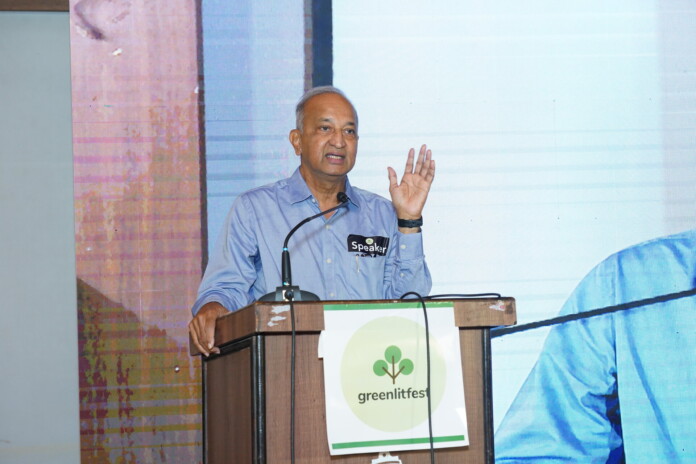Dr Karanth lamented the diminishing space for books, a metaphor for the shrinking room for nature amidst human expansion. “Reading is the window to knowledge and the world. I’ve been to big libraries and bookstores across the world, and one thing that saddens me is that gifts, trophies, and other stationeries are sharing spaces with books, making other potential books not have a space. The space for books is shrinking,” he remarked, drawing a parallel to the encroachment on natural habitats.
As a keynote speaker at the recent third edition of the Green Literature Festival – greenlitfest.com, Dr. Karanth, a luminary in wildlife conservation, remarked on the urgency of preserving our planet’s biodiversity. He founded the Centre for Wildlife Studies and his extensive work in tiger ecology brought to light critical issues facing nature conservation today. His research delved deep into the ecology of tigers and other large mammals, providing invaluable insights into their behaviours.
Distinguishing Environmentalism from Nature Conservation
Dr. Karanth emphasized the distinction between environmentalism and nature conservation, noting that while environmentalism aims to make the world better for humans, nature conservation adopts a more holistic approach. He stated, “Nature conservation is about all underrepresented species on Earth. Everyone and every species. Big species and domesticated animals are bearing on wild nature due to our actions.” This perspective underscores the need for a broader, inclusive approach to conserving biodiversity.
The Impact of Human Development on Biodiversity
Highlighting the dramatic shift in the balance of nature post-agriculture, Dr Karanth shared startling statistics: “10,000 years ago, human biomass was just 1 percent of all biomass of mammals. Now, we occupy 97 per cent, leaving just 3 per cent for all other creatures. We can’t let go of that percentage; we must be serious about nature conservation.” This profound change underscores the critical need for sustainable practices in agriculture and energy production, which are the primary drivers of biodiversity loss.
Optimism in the Face of Challenge
Despite these challenges, Dr. Karanth’s speech was not without hope. He reflected on changes in land use, from agrarian to forested areas, and the potential for nature to rebound if given a chance. “I’ve not seen a wild tiger free in nature since 1982. But nature has come back for good in certain areas. With the right chemistry of reason and logic, supplemented by emotions, we can be optimistic about our conservation efforts,” he said.
Dr Ullas Karanth’s speech at the Green Literature Festival 2023 was more than a call to action; it was a profound reminder of our responsibility towards the myriad species sharing our planet. His words, steeped in decades of experience and dedication to wildlife conservation, offered a blend of realism and hope, urging us to rethink our relationship with nature. As Dr Karanth concluded, the audience was left with a renewed sense of urgency and the realization that preserving our planet’s biodiversity is not just an environmental issue, but a moral imperative for all of humanity.
Dr Karanth’s expertise is recognized internationally, evident in his roles with the World Conservation Union’s specialist groups on diverse species, and his co-founding of the academic program in wildlife biology and conservation at NCBS-TIFR Bangalore. His association with prominent conservation organizations in India, such as the Wildlife Institute of India and the Bombay Natural History Society, further underscores his influence in shaping wildlife conservation policies and practices.
Watch the full speech here: https://www.youtube.com/watch?v=viWZIVNBLk4&feature=youtu.be










